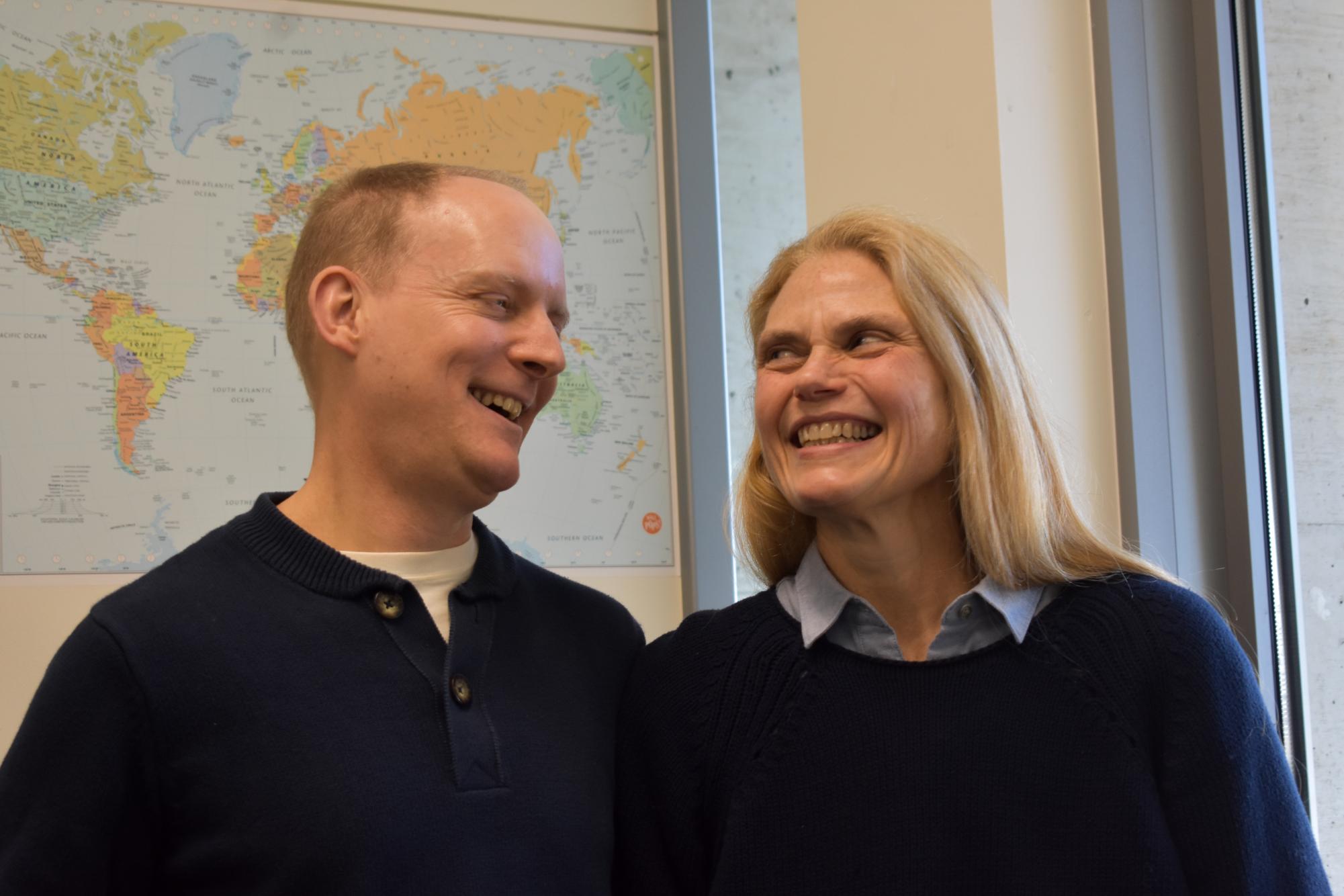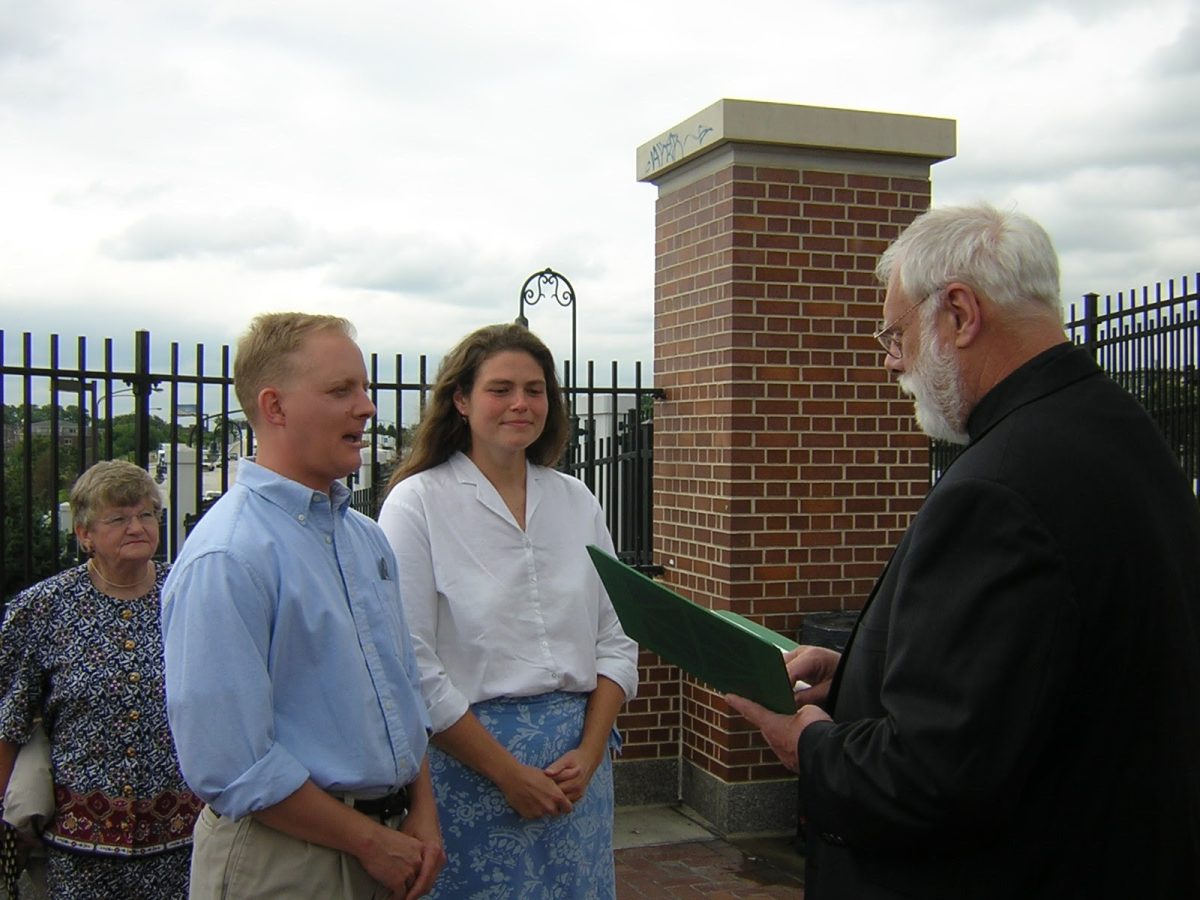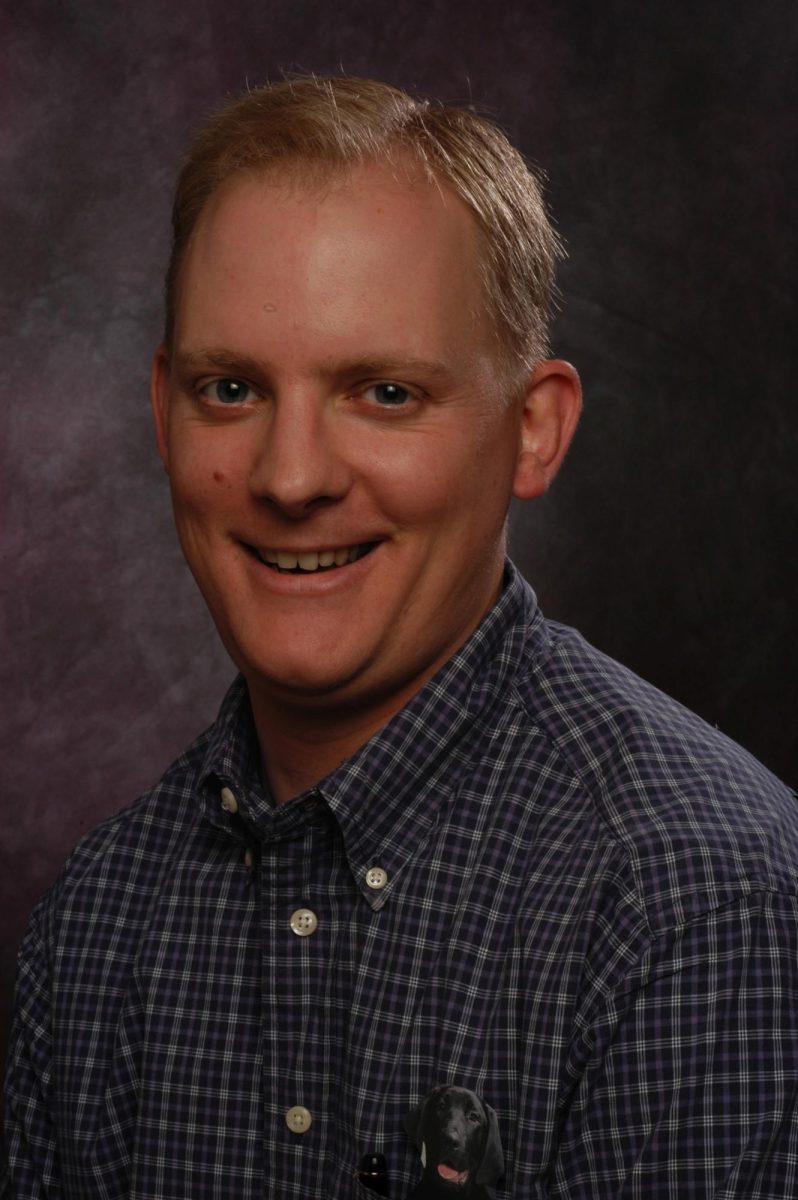Standing on a pier in Philadelphia, Pennsylvania, Dr. Michael Baranowski and Dr. Kimberly Weir professed their “I do’s.” The date was August 5, 2004. Surrounded by a preacher, eight attendees, the flowing Delaware river and the enveloping August air, the duo marked the beginning of their life together.
Then they returned to Northern Kentucky University to begin their fourth and second year of teaching political science, respectively.
The duo’s marriage was hardly a surprise to their closest colleagues, who had been officially prefaced of the romantic relationship by an email from Baranowski.
The NKU journey began in 2001 for Cleveland-native Baranowski when he was hired as a faculty member in the department of political science. Baranowski, who spent four years as a professor at Indiana’s University of Evansville beforehand, yearned to be in a larger metropolitan area. When the opportunity presented itself at Northern Kentucky, he jumped on it.
Dr. Melissa Moon, who has served as a professor of criminal justice since 2000, aided in the interviewing process for the professor. “I just remember I was like, ‘They’ve gotta hire this guy,” she recalled with a laugh.
Two short years later, Baranowski would be quoting the exact same sentiment about his future wife, as he chaired the search committee that brought Weir aboard in 2003.
Weir, who had just wrapped up her doctorate degree at the University of Connecticut, was one of 118 candidates who threw their hat in the ring for professorship at NKU. It was her enthusiasm, idealism and strong desire for teaching that compelled Baranowski to push for her job offer.
“That worked out as the best decision I ever made in my life,” Baranowski grinned.
When Weir made the move from snowy Pennsylvania to the Greater Cincinnati region, it was Baranowski who helped her acclimate to a career at NKU and occupied the office space across from hers. It was in this phase that the two professors’ relationship began to bud. It was obvious, Baranowski said, that the two enjoyed spending time together.
“When you find your person, you just sort of know. And we both sort of knew pretty directly,” he shared.
This brought the couple to the pier on South Street in Philadelphia, where they officially—and legally—became the political science spouses.
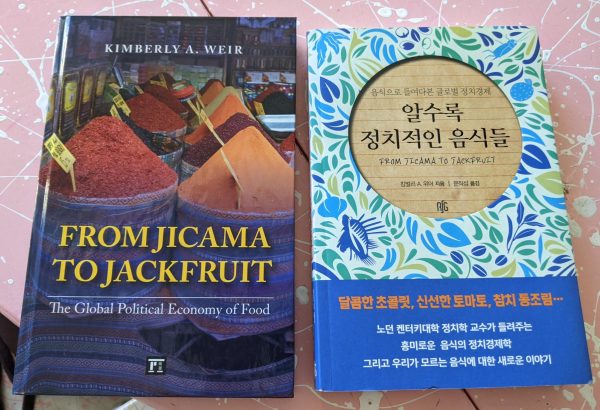
The two are known for their love of teaching, their creativity in the classroom and the deeply-rooted care they have for their students. Weir prides herself on having memorized each student’s name every semester, usually within the first week. She has created tons of courses, including The Politics of Food, which she debuted her first year at the university. She even wrote the book for her class on International Political Economy.
The duo’s dedication didn’t end in the classroom, though, as they recalled inviting students into their home for grill-outs and dinner parties. “At the end of the spring semester, we’d invite a bunch of students over and grill hotdogs and hamburgers,” Baranowski recalled. “It was a nice way to leave with the students socially and it was a lot of fun.”
Classroom antics, or “quirks” as some called them, have been a staple in Baranowski’s classes throughout the years. Every once in a while, the class would take a break to compete in chair races, rolling down the hallways of Landrum in wheely chairs to see who would make it the furthest. Or sometimes they would shoot for more strategic competitions, like the traditional paper airplane contest. “[It was] just for a break, something a little different,” Baranowski said.
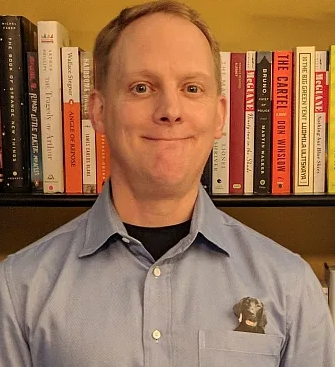
He was known by more than just students for his humor, as Moon discussed her favorite memories with the political science enthusiast. A physical attribute of Baranowski is the ever-present photo of a dog that pokes out from his shirt pocket. Lately, Moon said, a black lab—which serves as a relic of the couple’s now deceased dog Ernie—has been the choice of photo that remains in his pocket. Even when he wears a shirt without a pocket, the dog is somehow a constant accessory. Baranowski said this touch is a way of letting people know where his loyalty lies as a dog lover, as well as making other people smile.
Baranowski is also known for being quite the holiday gift giver. Moon ran through an impressive list of presents that would mysteriously appear in faculty mailboxes around Christmas: a rubber chicken, Slinky, back scratcher and faculty-favorite foam sword.
When Baranowski served as chair of the Faculty Senate’s Professional Concerns Committee, faculty members actually looked forward to seeing a report from the professor in their emails, as they could count on his comedic wordplay and fun-poking nature to be intertwined throughout the more serious information, Moon said.
Diplomatic service has been a theme of the couple’s time at NKU. Baranowski has excelled as chair of the Professional Concerns Committee, president of Faculty Senate and his current role as faculty regent on NKU’s Board of Regents. The latter role is elected by the entirety of NKU faculty and is charged with representing professors’ perspectives in the university’s governing body. Baranowski has served five-and-a-half years in this position, and while he expressed his utmost gratitude and honor to be chosen by the faculty, it was clear the weight that comes with the role.
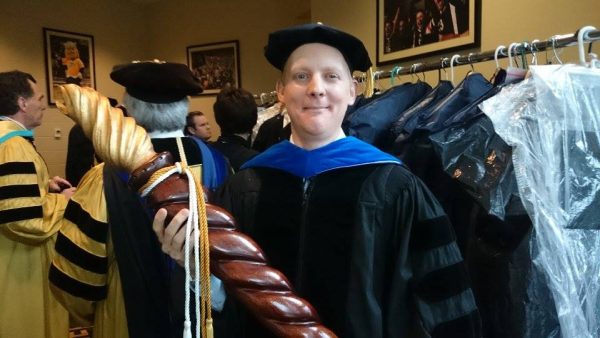
The past few years, Baranowski said, have been a busy and tough time, full of “painful decisions” as the university cut over 100 faculty members within the last year alone. This decision followed the announcement of an $18.7 million budget deficit in October 2022.
Weir has served students in many ways, including teaching a study abroad program in London and taking students to the Global Women’s Conference in Abu Dhabi of the United Arab Emirates. Sustainability and travel are two of the topics that drive Weir. During her classes, she shows off sustainably-made artifacts that she has collected from around the world, including an oil tin car from Madagascar and watercolor art from Cambodia.
Melanie Crespo, a junior who has taken three classes with the professor, was inspired by her knowledge of class topics and ability to bring pieces of the globe into the classroom. Weir has also been the only professor Crespo has taken that incorporates breaks into the class. “For two minutes we stand up, she advises us to dance or wiggle our arms,” Crespo said.
Classroom relationships are the driving force behind both Baranowski and Weir, and they both said these interactions are the things they will miss most when they depart at the end of the month. “Being in a classroom with students can just lift me up in a way that almost nothing else can,” Baranowski said.
An open exchange of ideas and debates is commonplace in Baranowski’s classroom. Matt Code, a first-year student at Chase College of Law, took a total of 10 classes with the couple. Code fondly remembered Baranowski’s role as a debate moderator in class, calling out blatantly untrue statements and ensuring students stayed on the right track. Both Weir and Baranowski wrote detailed letters of recommendation for Code as he applied to law school. Not only did they write letters, the law student said, they also sat down with him to consider the pros and cons of his next steps following undergrad.
Weir has hosted multiple conversations with Crespo, exploring the student’s goals for the future and how to obtain them. The professor even went out of her way to send Crespo a political science scholarship application, which she was nominated for and won. “Every single time [Weir] got an email about something I was interested in, she just sent it my way,” Crespo said.
As the COVID-19 pandemic struck and affected higher education, the spouses saw a shift to more and more online courses. Weir—who features a no-technology mandate in her classroom—and Baranowski both decided the time for their departure was nearing as in-person interaction decreased and their personal hobbies increased. Weir has taught her first 16-week online course this semester and says she can’t imagine continuing this shift. “I can’t imagine teaching International Political Economy as an online class,” she said. “I don’t know how people can do it effectively. The concepts are just so complicated.”
When the opportunity came to apply for the Faculty Voluntary Separation Program—which would pay eligible faculty 80% of their salary and $10,000 in health care spending to depart from the university—the duo decided to apply. To their surprise, they were accepted for the separation program. “We went with what the universe was telling us,” Baranowski said of their program approval.
Both professors were nominated by their colleagues for “emeritus status” and were approved by the university. This status allows professors to continue holding their title even after retirement, honoring a distinguished tenure at their university.
When the end of the fall 2023 semester rolls around, the couple will still find many ways to stay busy.
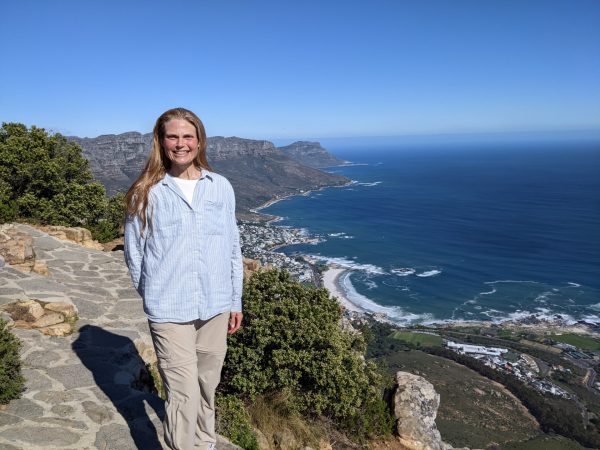
Weir has a book contract to write about sustainability issues that she plans to finish, as she never got to fulfill the contract when the pandemic hit. Many potential travels are in her future as well, including a trip to Vietnam that was also delayed because of COVID-19. “I’m like a jack of all trades, master of none,” Weir joked. “We’ll see where my interests take me.”
Baranowski plans to continue his podcast “The Politics Guys,” which he hosts with a Chase Law professor and former NKU student. The group divulges American politics from both conservative and liberal perspectives, with the purpose of getting listeners to talk to one another and broaden their perspectives. The podcast group has even hosted members of Congress and various journalists to share their ideas.
Moving abroad is not out of the cards for Baranowski and Weir. Last summer they traveled to France and Italy—two places they are considering moving to. But they’re also thinking about the New England states, as Weir is a huge fan of snow and a Pennsylvania native.
“For now, we’re just going to be here and see what it’s like to not be teaching at NKU full time,” Baranowski said.
The two had wise words of parting advice for their colleagues and students, past and present.
Weir encouraged students with the same wanderlust as her to make life an adventure. “When you’re a student, you don’t have the money, but you have the time. When you’re my age, you have the money, but you don’t have the time,” she said. All the money in the world doesn’t add up to enjoyment, Weir said, and both professors said their ultimate goal is for students to do what makes them happy.
Baranowski challenged students and faculty to shift their focus to the present, rather than be clouded by the past or too focused on what comes next. “Be where you are,” he concluded.



